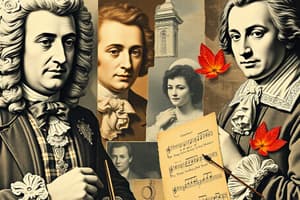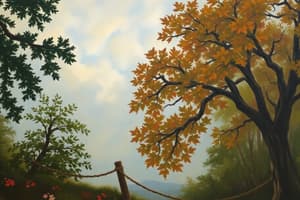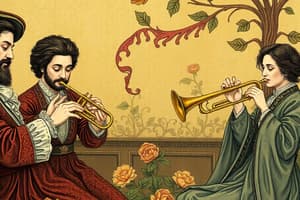Podcast
Questions and Answers
Who is known for his compositions for organ, orchestra, and oratorio?
Who is known for his compositions for organ, orchestra, and oratorio?
John Sebastian Bach
Which of the following works is associated with John Sebastian Bach? (Select all that apply)
Which of the following works is associated with John Sebastian Bach? (Select all that apply)
- The Four Seasons
- Fugue in G minor (correct)
- Well-tempered Clavier (correct)
- Messiah
What is the most famous piece composed by Antonio Vivaldi?
What is the most famous piece composed by Antonio Vivaldi?
The Four Seasons
George Friedrich Handel composed mainly instrumental concertos.
George Friedrich Handel composed mainly instrumental concertos.
What is a characteristic of Gregorian Chant?
What is a characteristic of Gregorian Chant?
What is the term for secular music that emerged at the latter part of the medieval period?
What is the term for secular music that emerged at the latter part of the medieval period?
Which of the following is NOT a main section of the Mass?
Which of the following is NOT a main section of the Mass?
Who is considered the greatest master of the Roman Catholic Church?
Who is considered the greatest master of the Roman Catholic Church?
Madrigal is a form of secular vocal _____ music composition which originated from Italy.
Madrigal is a form of secular vocal _____ music composition which originated from Italy.
Flashcards are hidden until you start studying
Study Notes
Famous Composers of the Baroque Period
John Sebastian Bach
- Renowned for compositions for organ, orchestra, and oratorio.
- Served as Cantor, a significant and enduring role in his career.
- Major works include:
- Concerto Grosso: Exemplified by the Brandenburg Concertos.
- Masses: Notable example includes the Mass in B Minor.
- Cantatas: Includes Cantata 208 and 211.
- Fugues: Illustrated in the Fugue in G minor.
- Clavichord and Harpsichord Works: Prominent work is the Well-tempered Clavier.
Antonio Vivaldi
- Nicknamed Il Prete Rosso ("The Red Priest") due to his red hair.
- Italian Baroque composer, a Catholic priest, and skilled violinist.
- One of Baroque music's most influential figures.
- Famous for his violin concertos and sacred choral pieces.
- Notably emphasized the role of string instruments in his compositions.
- The Four Seasons: A celebrated series of four violin concertos representing Spring, Summer, Autumn, and Winter.
George Friederich Handel
- Self-taught harpsichord player, showcasing remarkable musical talent.
- Remembered for impactful operas and oratorios.
- Became a prominent figure in English music.
- Messiah: His most acclaimed work, created in just 24 days; premiered in Dublin, achieving instant success.
Music of the Medieval Period
- Also known as the Middle Ages or "Dark Ages," beginning with the fall of the Roman Empire.
- Characterized by sacred and secular music, mostly monophonic.
- Monody: Represents a single melodic line.
- Plainsong/Plainchant: Unaccompanied single melody typically used in liturgical contexts.
Vocal Music of the Medieval Period
Gregorian Chant
- A form of unison liturgical music in the Roman Catholic Church.
- Utilizes neumes for musical notation.
- Characteristics include:
- Monophonic texture.
- Free meter without strict rhythmic patterns.
- Modal structure, often based on Latin liturgy.
Troubadour Music
- Emerged later in the medieval period, independent from Catholic restrictions.
- Characteristics include:
- Predominantly monophonic.
- Often accompanied by improvised instruments.
- Composed in French, focusing on themes like chivalry and courtly love.
- Originated in France.
Composers of the Medieval Era
Adam de la Halle
- Known as Adam le Bossu (Adam the Hunchback).
- A versatile French trouvère, poet, and musician.
- Recognized as one of the oldest secular composers with a unique style.
Music of the Renaissance
- "Renaître" translates to "rebirth," indicating cultural revival.
The Three Basic Purposes of Renaissance Music
- Worship in Catholic and emerging Protestant churches.
- Entertainment and enhancement of courtly life.
- Dance music for social gatherings.
Characteristics of Renaissance Music
- Rise of polyphony, marking the "Golden Age" with four or more equal vocal parts.
- Frequent imitation between voices.
- Flowing melodic lines with balanced expression.
- Introduction of the bass register.
- Gentle rhythmic flow without pronounced beats.
- Emphasis on clarity, balance, and euphony.
- Continued use of church modes in both sacred and secular music.
Vocal Music of the Renaissance Period
Madrigal
- Secular, polyphonic vocal music originating in Italy.
- Sung during social gatherings, reflecting poetic themes.
- Characteristics include:
- Polyphonic texture, often sung a cappella.
- Through-composed format.
- Voicing typically ranges from 2 to 8, with 3 to 6 being common.
Mass
- Sacred musical composition aligning with the Eucharistic liturgy.
- Characteristics highlighted by polyphony.
- Main sections include:
- Kyrie (Lord Have Mercy)
- Gloria (Glory to God)
- Credo (I Believe)
- Sanctus et Benedictus (Holy and Blessed)
- Agnus Dei (Lamb of God)
Motet
- Polyphonic choral work in Latin suited for various church services.
- Typically performed a cappella and marked by imitative sound qualities.
Composers of the Renaissance Era
Giovanni Pierluigi Da Palestrina
- Considered the greatest master of the Roman Catholic Church's music.
- His compositions primarily consist of sacred music, exemplified by the Pope Marcellus Mass, a model of Counter-Reformation style.
Thomas Morley
- Most renowned composer of secular music during his era.
- Created madrigals that showcased diverse styles and techniques, characterized by a light and approachable nature with influences from Italian music.
- Also served as an organist at St. Paul's Cathedral.
Studying That Suits You
Use AI to generate personalized quizzes and flashcards to suit your learning preferences.




